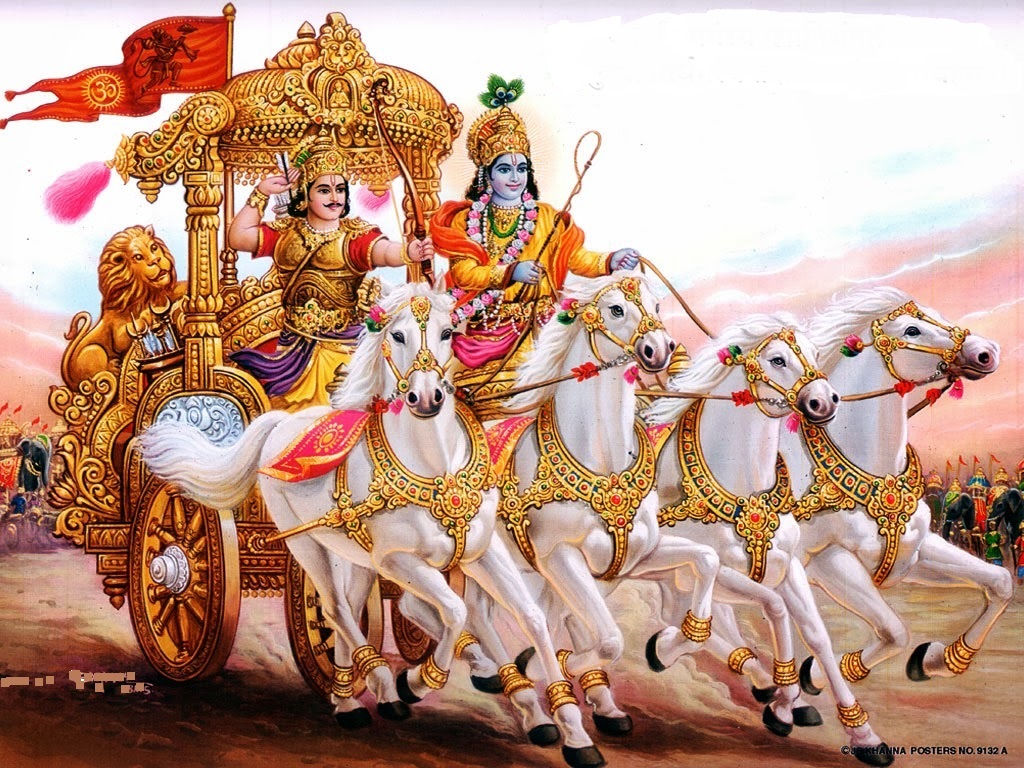The Relevance of the Bhagavadgita to Humanity 3.2 - Swami Krishnananda.
===================================================================================
Sunday 07, Apr 2024 07:30.
The Relevance of the Bhagavadgita to Humanity
The First Six Chapters of the Bhagavadgita:
Chapter 3: The Aranya Parva of the Mahabharata -2.
===================================================================================
What are these doubts? They are the voices of the world speaking at the same time, simultaneously with the earlier voice which said that the aim of life is spiritual realisation, union with the Almighty. No wife of a husband will refuse to accept that God is the Ultimate Reality. Everyone will say, “Yes, I understand.” But when the husband insists on these issues and becomes pronounced in his love for God in actual outward behaviour, the dear wife, who is the partner of this husband in the house, who cannot deny that God is the Supreme Being and the Ultimate Reality, will add, “You have to listen to my voice also a little bit. I understand, my dear husband, that God is to be pursued, but I am also here, and you cannot say that I am not here.” This is what the world tells you when you say, “I shall pursue God.” The world replies that you have to consider that it is also existing there. “I have been with you,” says the wife, “and you cannot say that you have nothing to do with me.” Though religious life is highly praiseworthy and it is the aim of everybody, the world says, “I understand what you say, but you have to listen to what I say also.”
This is a difficulty. You do not know what to do. The pulls of the earth reveal themselves in the forms of justifiable doubts, and you feel a duty towards the world. Mature minds begin to feel a difficulty of this kind – and highly mature minds, not ordinary mature ones. Sometimes there are humanitarian pulls from the earthly side, social pulls, and we may not be far wrong if we think they can be even nationally motivated, political pulls which may look like spiritually motivated aspirations. But there are subtler calls of the earth, not so gross as the pulls of humanitarian outlook and social behaviour. The subtler ones are called the instincts and the impulses of the lower nature, as we generally call them. They bring about a tussle in the personality.
I was casually mentioning yesterday that we live in different levels of personality, not only in one level. We live in all the fourteen worlds at the same time. We are the physical body – yes, right. We are also the sense organs; that is also right. We are the prana, yes. We are the mind; that is also true. And we have a reason, an intellect to think. That is also correct. Now, all these layers of our personality are valid expressions and reasonable levels, requiring justifiable attention. We cannot over-emphasise any particular level. Sometimes, in an over-enthusiastic mood, we are likely to lay excessive emphasis on one particular level. It is said that harmony is yoga, and it should be understood as harmony in every blessed thing – harmony in eating, harmony in daily routines, harmony in social behaviour, harmony in your performance of office work or vocational duty, and also harmony in your duty to the inner layers of your own personality. When it is said that yoga is balance, there is a wide meaning inside this statement. Anything can be stuffed into it. Balance is yoga. “All life is yoga,” say some yogis. Sri Aurobindo was fond of emphasising that all life is yoga. What is meant by saying that all life is yoga? And if, at the same time, we say that yoga is balance, then all life is balance. It can be any kind of balance. It is a very great joy to believe that life is balance, and we are not supposed to upset the balance.
In the adolescence of spiritual aspiration certain turmoils of the psyche may manifest themselves in different degrees of expression, and they can be of any shape: one thing in me, one thing in you, and in different persons it is different things. Each one has to write for one's own satisfaction, at least in one's own mind, an autobiography of one's own self. You need not write a book. At least you may be aware of your own autobiography: How was I when I was a little boy? How was I when I was a little girl? What was I doing? What was I thinking? Am I thinking the same thing now? Why should I change my mind now? Traverse your thought through the whole gamut of the life that you have lived from your childhood days, as far as you can remember in your mind. Much of it you may remember, and some minor details you may not remember. You will be surprised at the varieties of experience that you have passed through, and the multitudinous variety of your likes and dislikes, many of which have been dropped as meaningless but which appeared very meaningful in earlier days. “When I was fourteen or fifteen, what were my likes and dislikes? Are they the same today when I am fifty or sixty? Why have they changed? Was I right at that time, or am I right now?” Compare your own status in different levels of your advance in psychological development. This is what I mean by saying to write your own autobiography in your mind, and judge yourself. “What has happened to me today, and what are the justifications for my outlook today as it is?”
*****
Continued
====================================================================================










Comments